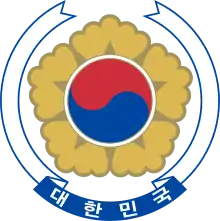1981 South Korean legislative election
Legislative elections were held in South Korea on 25 March 1981.[1]
| |||||||||||||||||||||||||||||||||
All 276 seats to the National Assembly 139 seats needed for a majority | |||||||||||||||||||||||||||||||||
|---|---|---|---|---|---|---|---|---|---|---|---|---|---|---|---|---|---|---|---|---|---|---|---|---|---|---|---|---|---|---|---|---|---|
| Turnout | 77.7% ( | ||||||||||||||||||||||||||||||||
| |||||||||||||||||||||||||||||||||
| |||||||||||||||||||||||||||||||||
 |
|---|
| This article is part of a series on the politics and government of the Republic of Korea |
|
|
The new electoral system abolished appointed seats (1/3 of the National Assembly), which was replaced by proportional representation. The result was a victory for the Democratic Justice Party, which won 151 of the 276 seats in the National Assembly. Voter turnout was 77.7%.
The election was held under the influence of Coup d'état of 1979 and 1980. Major opposition political figures like Kim Young-sam was barred from running. Kim Dae-jung was arrested on May 17, 1980, and was a prisoner under death row, having been convicted of a fabricated charge of "inciting rebellion". Even the conservative Democratic Republican Party of Park Chung-hee was forcibly dissolved, and major figures like Kim Jong-pil was barred from running.
The election, while ostensibly a multi-party election, is widely considered to have been a fraudulent one, with supposed "opposition" politicians being heavily vetted by the Agency for National Security Planning and the South Korean Army Security Command.
Results
| Party | Votes | % | Seats | ||||
|---|---|---|---|---|---|---|---|
| FPTP | PR | Total | +/– | ||||
| Democratic Justice Party | 5,776,624 | 35.6 | 90 | 61 | 151 | +83 | |
| Democratic Korea Party | 3,495,829 | 21.6 | 57 | 24 | 81 | New | |
| Korean National Party | 2,147,293 | 13.2 | 18 | 7 | 25 | New | |
| Civil Rights Party | 1,088,847 | 6.7 | 2 | 0 | 2 | New | |
| New Politics Party | 676,921 | 4.2 | 2 | 0 | 2 | New | |
| Democratic Socialist Party | 524,361 | 3.2 | 2 | 0 | 2 | New | |
| Democratic Farmer's Party | 227,715 | 1.4 | 1 | 0 | 1 | New | |
| Peaceful People Party | 144,000 | 0.9 | 1 | 0 | 1 | New | |
| Socialist Party | 122,778 | 0.8 | 0 | 0 | 0 | New | |
| Korea Christian Democratic Party | 103,893 | 0.6 | 0 | 0 | 0 | New | |
| Unification National Group Party | 87,977 | 0.5 | 0 | 0 | 0 | New | |
| Won-il Democratic Founding Party | 76,863 | 0.5 | 0 | 0 | 0 | New | |
| Independents | 1,734,224 | 10.7 | 11 | 0 | 11 | –11 | |
| Invalid/blank votes | 190,520 | – | – | – | – | – | |
| Total | 16,397,845 | 100 | 184 | 92 | 276 | +45 | |
| Registered voters/turnout | 21,094,468 | 77.7 | – | – | – | – | |
| Source: Nohlen et al. | |||||||
Results by city/province
| Region | Total seats |
Seats won | ||||||||
|---|---|---|---|---|---|---|---|---|---|---|
| Democratic Justice | Democratic Korea | Korean National | Civil Rights | New Politics | Democratic Socialist | Democratic Farmer's | Peaceful People | Ind. | ||
| Seoul | 28 | 14 | 11 | 1 | 0 | 0 | 1 | 0 | 0 | 1 |
| Busan | 12 | 6 | 5 | 0 | 1 | 0 | 0 | 0 | 0 | 0 |
| Gyeonggi | 24 | 12 | 10 | 1 | 0 | 1 | 0 | 0 | 0 | 0 |
| Gangwon | 12 | 6 | 4 | 2 | 0 | 0 | 0 | 0 | 0 | 0 |
| North Chungcheong | 8 | 4 | 1 | 3 | 0 | 0 | 0 | 0 | 0 | 1 |
| South Chungcheong | 16 | 8 | 5 | 2 | 0 | 0 | 0 | 0 | 0 | 1 |
| North Jeolla | 14 | 7 | 6 | 0 | 0 | 0 | 0 | 0 | 0 | 0 |
| South Jeolla | 22 | 10 | 9 | 1 | 0 | 1 | 0 | 0 | 1 | 0 |
| North Gyeongsang | 26 | 13 | 1 | 5 | 0 | 0 | 0 | 0 | 0 | 3 |
| South Gyeongsang | 20 | 10 | 5 | 3 | 1 | 0 | 1 | 1 | 0 | 3 |
| Jeju | 2 | 0 | 0 | 0 | 0 | 0 | 0 | 0 | 0 | 2 |
| Constituency total | 184 | 90 | 57 | 18 | 2 | 2 | 2 | 1 | 1 | 11 |
| PR list | 92 | 61 | 24 | 7 | 0 | 0 | 0 | 0 | 0 | 0 |
| Total | 276 | 151 | 81 | 25 | 2 | 2 | 2 | 1 | 1 | 11 |
References
- Dieter Nohlen, Florian Grotz & Christof Hartmann (2001) Elections in Asia: A data handbook, Volume II, p420 ISBN 0-19-924959-8

